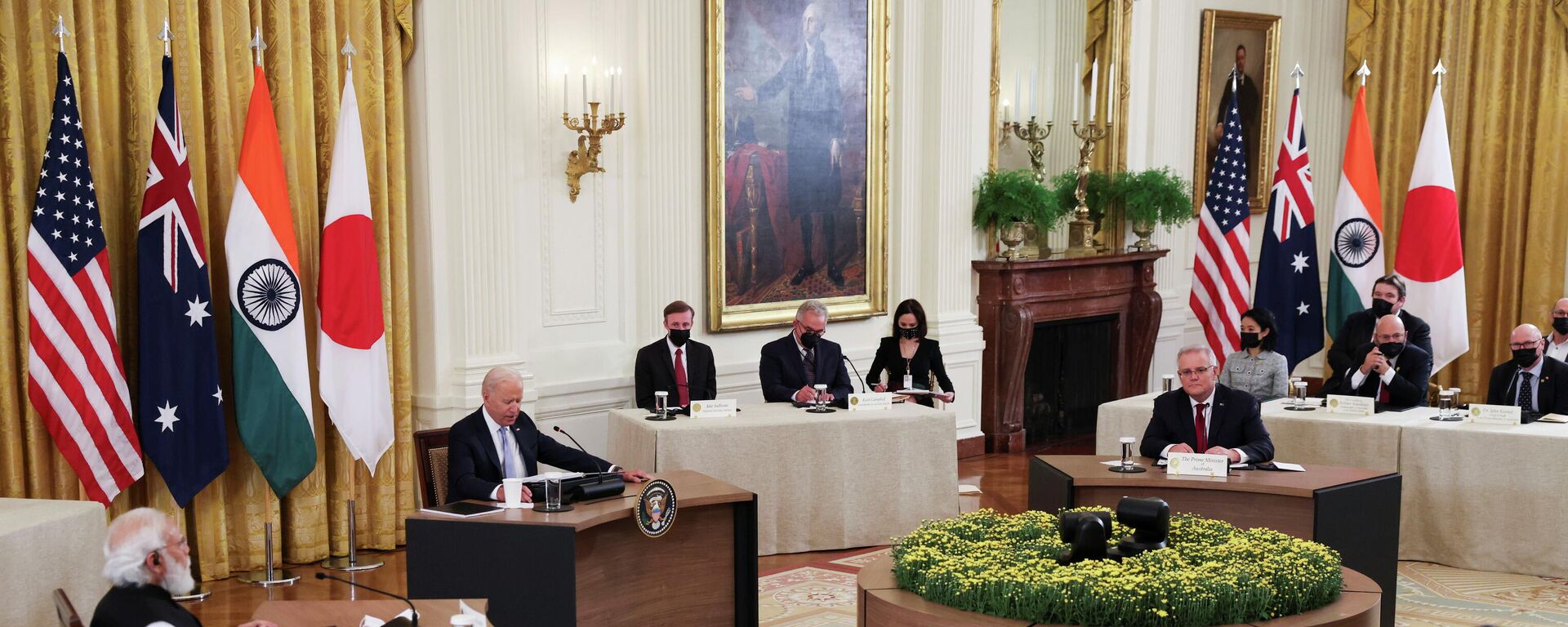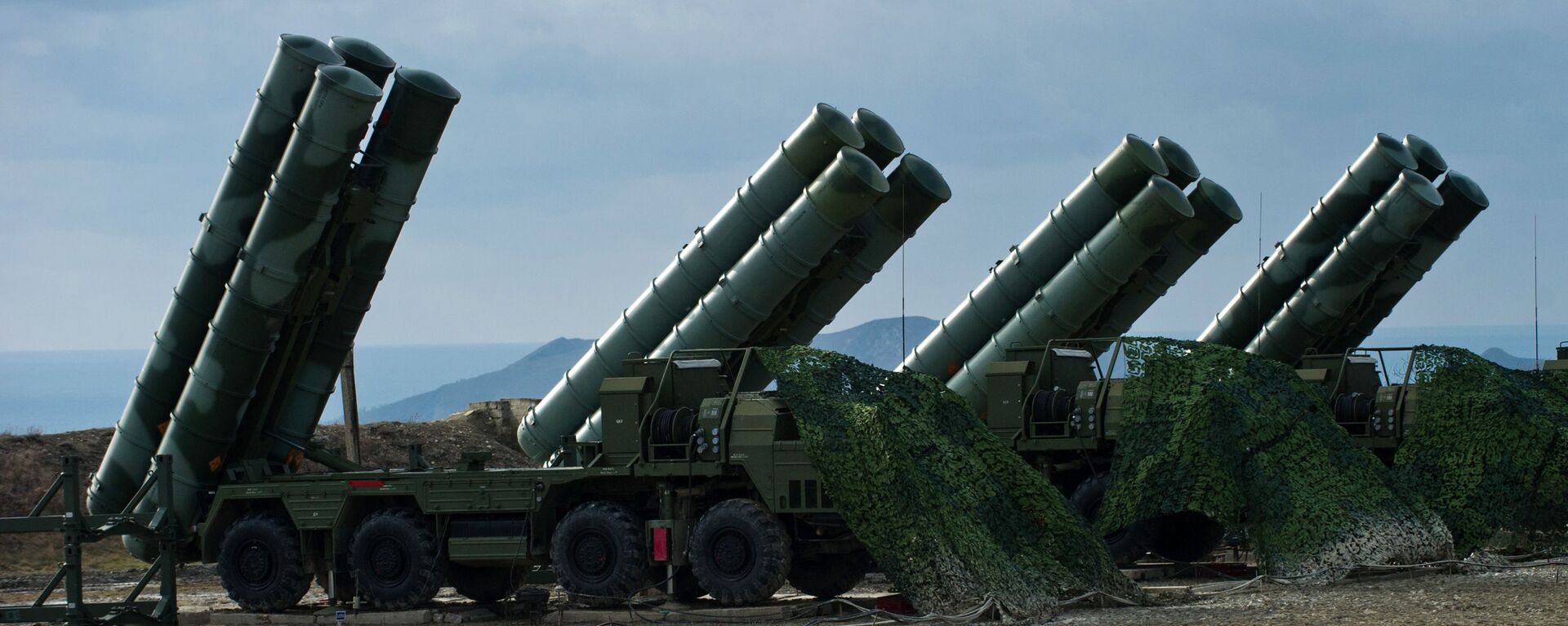https://sputnikglobe.com/20211103/us-congress-committee-mulls-expanding-five-eyes-alliance-to-add-india-japan-germany-south-korea-1090433390.html
US Congress Committee Mulls Expanding 'Five Eyes' Alliance to Add India, Japan, Germany, South Korea
US Congress Committee Mulls Expanding 'Five Eyes' Alliance to Add India, Japan, Germany, South Korea
Sputnik International
The Five Eyes (FVEY) is the intelligence-sharing alliance among the US, the United Kingdom, Australia, Canada, and New Zealand. It was originally conceived of... 03.11.2021, Sputnik International
2021-11-03T06:57+0000
2021-11-03T06:57+0000
2021-11-03T07:08+0000
us
japan
australia
germany
s-400
quadrilateral security dialogue (quad)
caatsa
five eyes
https://cdn1.img.sputnikglobe.com/img/07e5/08/02/1083504683_0:305:2561:1745_1920x0_80_0_0_e4f53aa584f2a1408d16f2e1c4062851.jpg
The US House Armed Services Committee has asked the director of national intelligence (DNI) and the secretary of defence to identify the "benefits" and "risks" of expanding the "Five Eyes" network to also include India, Japan, Germany, and South Korea.Gallego has reportedly introduced an amendment in the National Defence Authorisation Act (NDAA) for the year 2022 to formalise the House committee's proposal.The NDAA is meant to authorise defence spending by the US government. The NDAA 2022, the first one during Joe Biden's tenure, has proposed a budget outlay of $715 billion as defence spending for the current fiscal year."The committee believes that, in confronting great power competition, the Five Eye countries must work closer together, as well as expand the circle of trust to other like-minded democracies", it adds.India's Case Different Than South Korea, Japan, and Germany, Says Navy VeteranSeshadri Vasan, an Indian Navy veteran and presently the director of the Chennai Centre for China Studies (C3S), believes that the proposal to include India in the intelligence-sharing network reflects America's "increasing reliance" on New Delhi in the sphere of strategic cooperation. He says it includes intelligence gathering, surveillance, and maritime domain awareness.Vasan states that if India becomes a part of the Five Eyes network, it will be a "natural extension" of the strengthened defence cooperation between the two democracies in recent years.The Quadrilateral Security Dialogue, or the four-nation grouping comprising India, the US, Australia, and Japan, held its maiden leaders' summit in September. Under the previous administrations (Trump and Obama), the US and India sealed three foundational defence pacts to increase interoperability and intelligence-sharing - the Logistics Exchange Memorandum of Agreement (LEMOA), Communications Compatibility and Security Agreement (COMCASA), and the Basic Exchange and Cooperation Agreement (BECA).The Indian think tank chief, however, believes that the US could propose "riders" for India's potential membership in the Five Eyes network because of close strategic and defence ties between New Delhi and Moscow."I feel that the US could be a bit hesitant to share all the intelligence inputs with India and only look to share it in certain categories. However, the US would be more interested in collecting intelligence from New Delhi, be it the maritime domain or at the land border with China", he argued.At present, the $5.43 billion deal between India and Russia for the supply of S-400 "Triumf" surface-to-air missile systems is facing intense scrutiny in the US.US Deputy Secretary of State Wendy Sherman warned during a visit to India last month that buying the Russian S-400 missile system was "dangerous" and in "nobody's interest". She indicated that New Delhi could attract economic sanctions under the Countering American Adversaries Through Sanctions Act (CAATSA) should it go ahead with the transaction.However, several influential US senators, including India Caucus Co-Chairs Mark Warner (D-VA) and John Cornyn (R-TX), warned last week that targeting India under CAATSA could have "deleterious" consequences for the India-US defence partnership.The US senators also called upon Biden to grant a "waiver" to India over the deal. The first delivery of S-400s is scheduled to arrive in India by year's end.
https://sputnikglobe.com/20210925/china-warns-us-will-dump-india-australia-and-japan-as-four-nations-convene-for-quad-summit-1089391336.html
https://sputnikglobe.com/20211027/us-senators-ask-biden-to-waive-caatsa-sanctions-against-india-for-buying-s-400-missile-systems-1090235574.html
japan
australia
germany
Sputnik International
feedback@sputniknews.com
+74956456601
MIA „Rossiya Segodnya“
2021
News
en_EN
Sputnik International
feedback@sputniknews.com
+74956456601
MIA „Rossiya Segodnya“
Sputnik International
feedback@sputniknews.com
+74956456601
MIA „Rossiya Segodnya“
us, japan, australia, germany, s-400, quadrilateral security dialogue (quad), caatsa, five eyes
us, japan, australia, germany, s-400, quadrilateral security dialogue (quad), caatsa, five eyes
US Congress Committee Mulls Expanding 'Five Eyes' Alliance to Add India, Japan, Germany, South Korea
06:57 GMT 03.11.2021 (Updated: 07:08 GMT 03.11.2021) The Five Eyes (FVEY) is the intelligence-sharing alliance among the US, the United Kingdom, Australia, Canada, and New Zealand. It was originally conceived of as a pact between the US and the UK to facilitate cooperation during World War II and was later expanded to comprise the three other English-speaking nations.
The US House Armed Services Committee has asked the director of national intelligence (DNI) and the secretary of defence to identify the "benefits" and "risks" of expanding the "Five Eyes" network to also include India, Japan, Germany, and South Korea.
"[The] Five Eyes intelligence-sharing pact is a World War II relic that needs updating to better keep tabs on China", Ruben Gallego (D-AZ), a member of the Armed Services Committee told US news website Defence One on Tuesday.
Gallego has reportedly introduced an
amendment in the National Defence Authorisation Act (NDAA) for the year 2022 to formalise the House committee's proposal.
The NDAA is meant to authorise defence spending by the US government. The NDAA 2022, the first one during Joe Biden's tenure, has proposed a budget outlay of $715 billion as defence spending for the current fiscal year.
"The committee acknowledges that the threat landscape has vastly changed since the inception of the Five Eyes arrangement, with primary threats now emanating from China and Russia", the proposal by the House committee says.
"The committee believes that, in confronting great power competition, the Five Eye countries must work closer together, as well as expand the circle of trust to other like-minded democracies", it adds.
India's Case Different Than South Korea, Japan, and Germany, Says Navy Veteran
Seshadri Vasan, an Indian Navy veteran and presently the director of the Chennai Centre for China Studies (C3S), believes that the proposal to include India in the intelligence-sharing network reflects America's "increasing reliance" on New Delhi in the sphere of strategic cooperation.
He says it includes intelligence gathering, surveillance, and maritime domain awareness.
"The US clearly wants India to play the role of a security facilitator in the (Asia-Pacific) region", stated the ex-Indian Navy officer.
Vasan states that if India becomes a part of the Five Eyes network, it will be a "natural extension" of the strengthened defence cooperation between the two democracies in recent years.

25 September 2021, 07:18 GMT
The Quadrilateral Security Dialogue, or the four-nation grouping comprising India, the US, Australia, and Japan, held its
maiden leaders' summit in September.
Under the previous administrations (Trump and Obama), the US and India sealed three foundational defence pacts to increase interoperability and intelligence-sharing - the Logistics Exchange Memorandum of Agreement (LEMOA), Communications Compatibility and Security Agreement (COMCASA), and the Basic Exchange and Cooperation Agreement (BECA).
"India, Australia, the US, and Japan are already cooperating under the Quad framework", noted Vasan.
The Indian think tank chief, however, believes that the US could propose "riders" for India's potential membership in the Five Eyes network because of close strategic and defence ties between
New Delhi and Moscow."In that sense, India's case is a bit different from the other countries that the US committee wants to include in the Five Eyes. No other country has the sort of strategic autonomy that India has displayed in recent times. None of them are involved in defence and intelligence cooperation with Russia as India", he pointed out.
"I feel that the US could be a bit hesitant to share all the intelligence inputs with India and only look to share it in certain categories. However, the US would be more interested in collecting intelligence from New Delhi, be it the maritime domain or at the land border with China", he argued.
At present, the $5.43 billion deal between India and Russia for the supply of S-400 "Triumf" surface-to-air missile systems is facing intense scrutiny in the US.
US Deputy Secretary of State Wendy Sherman warned during a visit to India last month that buying the
Russian S-400 missile system was "dangerous" and in "nobody's interest".
She indicated that New Delhi could attract economic sanctions under the Countering American Adversaries Through Sanctions Act (CAATSA) should it go ahead with the transaction.

27 October 2021, 06:39 GMT
However, several influential
US senators, including India Caucus Co-Chairs Mark Warner (D-VA) and John Cornyn (R-TX), warned last week that targeting India under CAATSA could have "deleterious" consequences for the India-US defence partnership.
The US senators also called upon Biden to grant a "waiver" to India over the deal. The first delivery of S-400s is scheduled to arrive in India by year's end.



